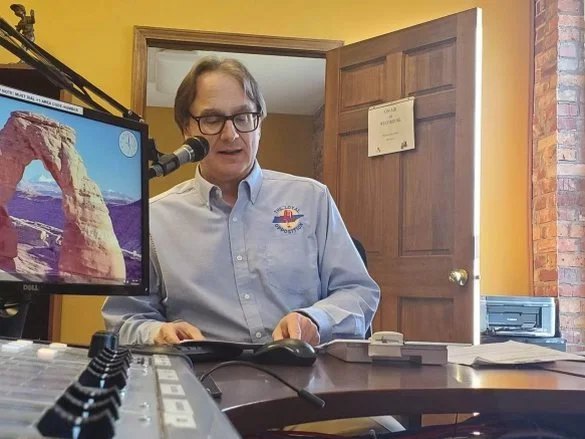The Healing Power of Telling Your Story
Written By Brandi Fleck
This is advice on moving past the fear of vulnerability and judgement to free parts of yourself through storytelling.
Quick Disclaimer: Some links in this article are affiliate links. That just means we’ll earn a small commission at no additional cost to you when you purchase using our links. That’s great, because we’d be telling you about this stuff anyways, and your support helps us to keep bringing you life-changing resources, like the one you’re reading here. Rock on.
I have this pattern in life where, on occasion, I think I’m done healing. I should know better by now, right?
As experience has shown in my own life, when the time comes to need more healing, I should no longer be surprised. I should recognize the false sense of security that plays into this pattern. It 100% comes to pass that the need for healing comes back, no matter how well-adjusted I feel for a given stretch of time.
This is part of the human experience. Becoming wounded and then being capable of healing is designed by nature (and God or the Universe - whichever term you prefer). Healing can be complex with a lot of moving parts and pieces. But, one part of healing wounds and healing the wounds of others involves sharing our stories.
So what is your story?
Your story includes the events of your whole life, yes, but it’s also made up of your emotions, feelings, hopes, fears, traumas, modes of expression, patterns, core values, goals, family, family and friend influences, community, artistic influences, tastes, and your perception.
Whoa. Perception?
Your story is complex, layered, and valuable. But let’s talk about perception for a minute.
Your perception shapes how you view your story. Your perception shapes all the events that have ever happened to you, what you’re capable of doing, and where you’re capable of going. Your perception shapes the friends you choose, how people treat you, how you treat them, the boundaries you set, and so much more.
Your perception can change over time. Your perception is unique to you.
Telling Your Story Can Be Scary, For Sure.
Lack of control.
Being judged.
Being vulnerable.
These are fears that keep you from telling your story. When you hand your story over to another person, you’re no longer in control of it. That vulnerability and lack of control can occur if you’re sharing a particularly personal or triggering detail to a close friend in confidence or to a podcast host who will amplify your voice on a public platform.
Oftentimes, control feels good to those of us who’ve experienced adversity or trauma because when we were going through hard times, we felt as if we had no control. So, now, we can control the narrative in our minds. Granted, that thought doesn’t always keep the narrative from getting out of control in our own minds, but it’s in our minds, not in the hands of someone else, right?
There are all kinds of official psychology concepts around control and programs to help us recognize what we can’t control so we can let go to release worry and anxiety over a coping mechanism that no longer serves us. That’s deeper than we’ll go here for now, but to be vulnerable, to tell your story, you do have to let go of the need for control and trust the person you’re talking to.
I also find that when you can tell your story easily without becoming emotional, that often means you’re far along in the healing process. Your wound may have a scar, but it’s no longer open and, metaphorically, bleeding. Even so, that doesn’t mean nerves won’t pop up when you try to share.
I’m in a phase where I feel extremely well-adjusted and healed right now. Even still, I get a little nervous before opening up on the podcast or to a new person. I do it anyways though - open up.
So why was I nervous?
It can be hard to tell who will take care of your story and who won’t.
Having boundaries is okay when you’re sharing your story. You’re in control of the boundaries, even when letting go and opening up.
Tip: When preparing to share your story publicly, look into public speaking guidelines and write out high points of your story to use as reference points to help with nerves. Research the host or writer and platform you want to share on to be sure they’re credible and resonate with you. Do your due diligence to not only fight back nerves, but to grow your bravery.
When it comes to sharing in personal relationships, that can get tricky, because you have to be the judge of their character. If you’ve been through trauma, trusting your own judgement can be stressful. Depending on where you’re at in healing, it can be hard to know if your baggage is talking or if you’re judging accurately.
There aren’t Google reviews on individual character. And even if there were, wouldn’t that be horrible? I would want to find out a person’s character for myself anyways, despite it all.
So Use Discernment
If we had never been hurt by someone we were vulnerable with, would we still be nervous to share our stories?
Maybe. But have you ever told someone you’re close to a secret about yourself and then felt betrayed because they use it against you later or judge you in a way you never dreamed would happen? Yeah - we need to be good judges of character before sharing personal stories, and even then, we can still make mistakes and get hurt. Even then, it’s still worth it to keep trying.
It’s happened to me before, for sure.
“You show your hand too easily,” I’ve been told.
It’s probably true. And in my divorce, it really came back to bite me.
But, I’d rather live openly than suppress what lives inside my soul, and if I end up getting judged along the way or losing friends, I will remember that it’s more about the person who did the judging and leaving than it was about me. So, it’s more about who did the judging or leaving than it was about you too!
I’ll say that again for those of you in the back: external judgement, manipulation, abandonment, or harsh words in reaction to your story are not about you. They’re about the person doing them because your story triggered an emotion, insecurity, or wound in that person that they may not even realize.
Using discernment when sharing your story is good, because you want to trust the person you’re confiding in or sharing with, but ultimately, that’s not foolproof and sharing your story is a better choice than not.
But Telling Your Story Can Also Be Healing
Here’s a list of five reasons why telling your story can be healing:
1. Telling your story helps you process events
…in ways you may not have done had the story remained inside your head and heart. By letting it out, you’ll discover feelings you may be ignoring - giving them a name brings the into existence and validates those feelings so you can know what they are and work with them.
On the flip side, when others hear your story and relate, they process events in their lives too through your perspective. Hearing a differing perspective about similar experiences could be just the mindset shift a person needs to start their own healing.
2. Telling your story helps you stay in touch with your true self
In the bustle of helping the kids with homework, working, cooking dinners, doing laundry, and all the other activities of daily life, which are now mostly homebound because of COVID-19, I feel like I’ve forgotten who I am sometimes.
Does that ever happen to you?
By telling your story, you can cement memories and values that may seem fluid in the midst of a hectic life. And, if life continues to slow down and hum at a more sustainable pace after the pandemic, which I hope it does, you’ll need to rely on your true self more than ever to find fulfillment when distractions are minimized as distractions an be a way to ignore feelings.
Plus, remembering the past helps us not repeat it by showing us lessons for improvement.
3. Telling your story helps You know you’re not alone
When you tell your story, especially in a public format such as in a podcast, a support group, or a group of friends, others can relate. Hearing your story helps others realize they’re not alone in similar experiences. In turn, they reciprocate by telling you about their experiences or they try to empathize if they haven’t had similar experiences. Both of these reactions are forms of compassion that increase connection and togetherness, which is the opposite of being alone.
When others interact with you in a compassionate way after you tell your story, it makes it easier to keep telling your story.
4. Telling your story humanizes you
Your story humanizes you to you.
Do you ever call yourself names? Do you ever berate yourself for messing up? Your internal dialogue is powerful. When you suppress your story, you may keep a more negative view of yourself than if you told it and your friends, acquaintances, or audience reacted compassionately, helping you remember that you’re only human. Being kind to yourself is okay and, in fact, so important to do.
I’m not saying care about what other people think. I’m saying that validation can be helpful at times. Outside perspectives can also be helpful when the one we’re carrying is hurting us. We may not even know it’s hurting us.
On the other hand, your story humanizes you to other people, who may not have given your life a second thought before they heard you. Not that other people’s approval is necessary to a joyful life - quite the contrary - but through humanization, listeners can treat others who may be like you with grace and respect because they heard your story.
Kindness starts with you and ripples out.
5. Telling your story helps you release negativity
When you don’t tell your story, you oftentimes end up suppressing an emotion or memory that can turn into a festering wound rather than one slathered in Neosporin with a big bandage. To use another sort of gross biology analogy (hey, my Mom is a nurse), you need to get rid of the infection to start healing.
Once the infection is gone, you can embrace more positivity because you’ll be looking through a lens of healing rather than infection.
Related: Recognizing Emotional Suppression and Patterns of Abuse to Heal
Examples of Storytelling Catharsis
Let’s go behind the scenes for a minute with the Human Amplified podcast, formerly the On Being Human podcast. For now, this is where we primarily focus on personal storytelling in this community, so we’re seeing the benefits with guests.
After the interview with Belinda Harvey for Episode 055: No Jutice, No Peace!, Belinda said to me, “This has been fantastic. It’s been kind of cathartic for me and almost like a therapy session. I’m just excited about the future.”
When I first approached Trey Cokeroft of Episode 026: Surrendering Control - Why a Passionate Teacher Let Go of the Education System, to be a guest on the show, he said, “I’ll do it, but I don’t know what I have to say.” Then afterwards, he was genuinely surprised by all the topics and feelings that arose from the conversation and what he really had to say.
Or to take it a step further, when I first asked Michelle Liter of Episode 047: Imagination with Purpose - Creating a Children’s Book, she said the thought of speaking publicly was terrifying, so we decided to let her think about it for a while and caught up again after a few months to gauge how she felt about telling her story. Spoiler alert! She came on the show, did a fantastic job, and we had a blast just talking about what brings her joy and sparks her passion.
One conversation that really stuck with me more than any of the others though was with Erin Grace of Episode 039: Stepping into Your Own Power through Energy Healing. Erin coming on the show was a particularly sensitive process, more so than any other guest so far. Erin had been working up the nerve to share her story publicly for some time and sought out Human Amplified as the first avenue for speaking aloud rather than writing only.
During her growth in sharing her story, she meditated and received guidance that her story, just as all of ours, belongs to the collective. Her story belongs to us all because we all are human in a human experience, learning and growing together. It has turned out that Erin’s episode is one of the most popular ones of the Human Amplified podcast, season 2. It must be resonating with listeners.
Of course, not every human is shy about sharing their story. Either way is okay. The point is, if you’re shy about it, it’s worth thinking about why and if the benefits of keeping your story suppressed outweigh the benefits of sharing it. Releasing it.
Ways to Tell Your Story
Ready to tell your story yet?
When we talk about sharing our stories, we typically think of using our voice to talk. But, there are so many other methods of expression. Perhaps you’re already using them and haven’t even considered that you’re sharing your story in that way.
Or, maybe you have considered that and just need more ideas for communication.
Let’s brainstorm.
Storytelling That Can Be Done in Private or Small Group Settings
Journal
Go into this with flexibility and write whatever comes up as your thoughts flow in stream of consciousness, revealing parts of your story.
Related: Finding Your Purpose through Journaling
Paint
Visual communication is just as important as verbal or physical. Let feeling guide the brush across paper or canvas as you think about who you are, even if you don’t consider yourself an artist.
Listen to music
Music from a time in your life when you were really grounded or joyful reminds you of that part of your story. Thinking about your life while remembering a feeling can help reframe your story to yourself.
Write a song
Putting creative words to music can tell your story in a way that just words may not, expressing your feelings and emotion, which are part of your story.
Dance
Dancing oftentimes allows our bodies to mimic emotional responses from real life. When you curve your back over, what emotion are you replicating? When you reach up, what are you replicating? That is part of your story.
Cook
Make a family recipe to remember your ancestral story. Share your story as you share the meal. Or, recognize what parts of your ancestral line need healing and figure out how to change the story.
Go Public with Your Storytelling
Do an interview for a blog or guest write for a blog
Star your own podcast or blog
Join a support group and participate
Join group therapy
Start a Facebook group
Look for applicable publish speaking opportunities and join
Join a panel discussion
Write a memoir and shop it around for publication
Create a product based on part of your story
Volunteer for a cause and talk to other volunteers about why you’re there
Share bits on social media
Can you think of any other ways to tell your story? Comment them below!
Connect
I hope this helped you all. In the spirit of telling your story, let us know in the comments below what scares you about sharing your story or why you’ve taken the leap to open up.
About the Author
Brandi Fleck is a writer, artist, and a recognized communications and interviewing expert. She is also an avid researcher of human nature and founder of Human Amplified, where she helps people embrace being their true selves so they can expand more fully into their own humanity without fear of being seen and heard. Brandi hosts the top-rated Human Amplified podcast (formerly the On Being Human podcast). READ MORE
Related Posts
Get to know your resident storyteller
Popular Article
Find Healing Support with Bed of Nails
We stand by these high-quality acupressure products that are the true originals. Shop our Bed of Nails link here.































